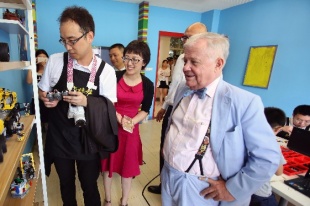Priceless advice


A Chinese translation of Jim Rogers' book A Gift to My Children: A Father's Lessons for Life and Investing has just been published.
For Jim Rogers, an investor from the United States, investment is not just about money.
His approach also reflects in how his children are educated.
For example, he has encouraged them to learn Mandarin at a young age. Recently, videos of Rogers' two daughters sending Chinese New Year greetings and singing in Chinese went viral online, with many Chinese viewers appreciating their accent-free Mandarin.
China is going to be the next great country, he says, which is why he wants his daughters to stay invested in it.
"They are already one step ahead of others," says Rogers, 76. "And I wrote, lectured and broadcast that people, everybody, should teach their children, grandchildren Mandarin."
He sees letting his daughters learn the language as one of his most important "investments", as he believes it will give them an advantage in achieving success in their future.
According to him, as China's economic, political and cultural influences keep growing and it becomes a key player internationally, Chinese will become a world language like English.
Rogers hired a native speaker to teach Mandarin to his daughters, aged 14 and 10, at home since they were babies. He moved his family from the US to Singapore partly because he wanted his daughters to go to Chinese-language schools there and use the language often, while being able to experience both Asian and Western cultures.
Rogers co-founded the Quantum Fund with George Soros in the 1970s, and made his fortune even before turning 40.
As a traveler, Rogers has visited China several times from the early 1980s to the late 1990s, including making a motorcycle tour of the country, from the eastern city of Shanghai all the way to China's western border. And, the experiences helped him gain a global perspective and he learned to evaluate prospects in rapidly developing economies such as China, he says.
Rogers sensed China's potential way back in the 1980s, when most analysts were highly skeptical of its prospects for growth.
While many people thought he was "crazy", Rogers trusted his own judgment, he says. He tried to search for all the information he could find to learn about China.
"But the most valuable research and study were my experiences of traveling through this truly huge country and observing it with my own eyes," explains Rogers, who started to make monetary investments in China in the late 1990s.
He was impressed by the hardworking nature and entrepreneurship of ordinary Chinese people he encountered during his travels, he says.
"If I hadn't been to China and put myself in Chinese society, I would have ignored those changes like many other Westerners," Rogers recalls. "I left with the thought, 'How could a country like this not develop?'"





































